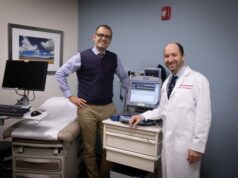
A study outside the clinical trial setting, which included US Medicare patients, has shown the effectiveness of the CardioMEMS HF system (Abbott) to significantly reduce heart failure hospital admissions and improve the quality of life in patients with chronic heart failure.
The retrospective cohort study, presented by Akshay Desai (director of the Heart Failure Disease Management Program at Brigham and Women’s Hospital in Boston, USA) at the 2017 scientific session of the American College of Cardiology (ACC; 17‒19 March, Washington, DC, USA), found a 45% reduction in heart failure hospitalisations in patients receiving the CardioMEMS HF System at six months post-implant, and a 34% reduction at 12 months post-implant. These data “compares favourably” with the 28% reduction in heart failure hospitalisations seen in the CHAMPION (CardioMEMS heart sensor allows monitoring of pressure to improve outcomes in New York Heart Association [NYHA] functional class III heart failure patients) clinical trial, reported Desai and others in the simultaneous publication of the study in the Journal of the American College of Cardiology (JACC).
The CardioMEMS HF System measures pulmonary artery pressures, which can be monitored by a heart failure team that adjusts medical therapy with the goal of preventing heart failure hospitalisations.
From 1,938 US Medicare patients who underwent CardioMEMS HF System implantation from 1 June 2014 to 31 December 2015, there were 1,114 who were continuously enrolled and had available data regarding healthcare utilisation for at least six months before and after implantation, and 480 who had complete data for 12 months before and after implantation. The authors note in JACC, that the majority of implants (74.7%) in the six-month cohort occurred in the ambulatory setting, rather than during a heart failure hospitalisation. Patients in both cohorts had a mean age of 71±11 years, 36% were women, and a large burden of comorbid medical illness, including diabetes, hypertension, and chronic obstructive pulmonary disease.
The results showed that among the 1,114 patients, there were 1,020 heart failure hospitalisations in the six months before implantation, compared with 381 heart failure hospitalisations, 139 deaths and 17 ventricular assist device implantations, or cardiac transplantations in the six months after implantation (hazard ratio [HR] 0.55; 95% confidence interval [CI]: 0.49 to 0.61; p<0.001).
The data also showed reduction of costs captured through reductions in heart failure hospitalisations associated with the use of the CardioMEMS HF system. In the six-month group, Desai et al reported a reduction of US$7,433 per patient. Similar reductions were noted in the subset of 480 patients with complete data available for 12 months before and after implantation (HR: 0.66; 95% CI: 0.57 to 0.76; p<0.001.)
“These results support the clinical effectiveness and potential cost savings of using an implantable haemodynamic monitor to help with heart failure management,” said Desai. “Reducing heart failure hospitalisations is an important goal for patients and hospitals alike, and may help to improve long-term clinical outcomes and quality of life for our patients.”
“These data, which are robust in competing risk models and in sensitivity analyses restricted to survivors as well as ambulatory implants, provide real-world evidence in an unselected population supporting the incremental value of this approach to heart failure management,” Desai et al highlight.
The CardioMEMS HF System received US FDA approval in 2014 as an approach to reducing heart failure hospitalisations in patients with chronic heart failure, NYHA class III functional capacity, and a hospitalisation for heart failure management in the year prior to implantation. The device is CE mark approved and has a class IIb recommendation as a directed therapy management and monitoring tool for heart failure patients in the 2016 European Society of Cardiology (ESC) guidelines for the diagnosis and treatment of acute and chronic heart failure.











